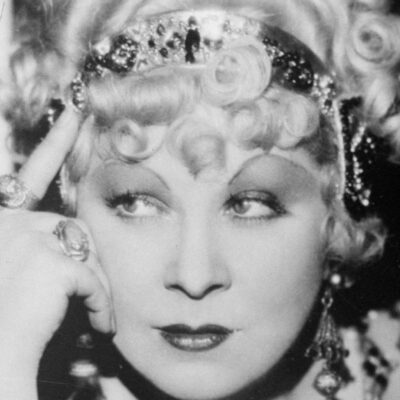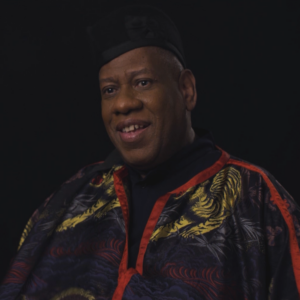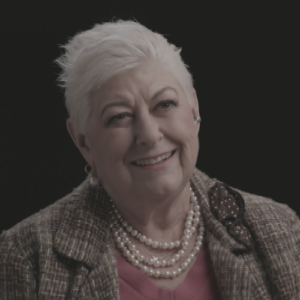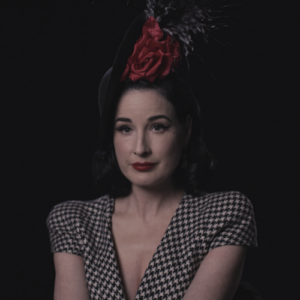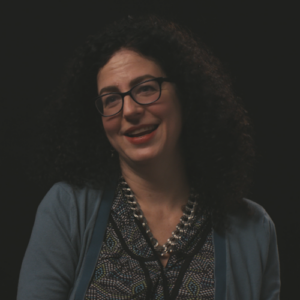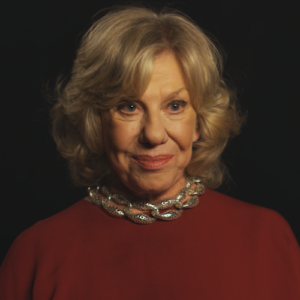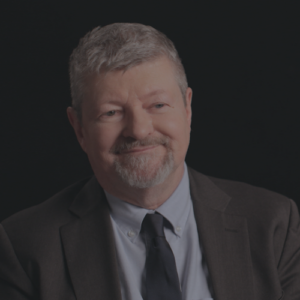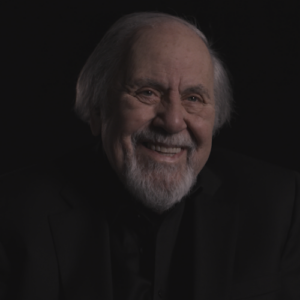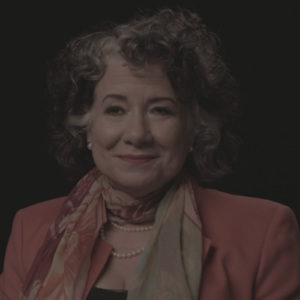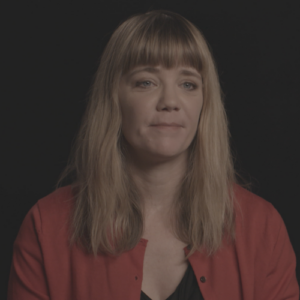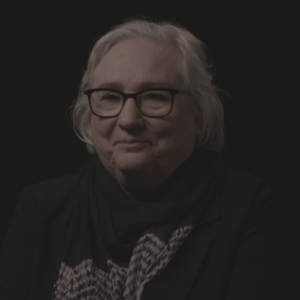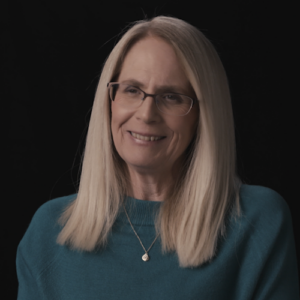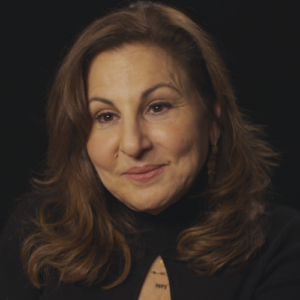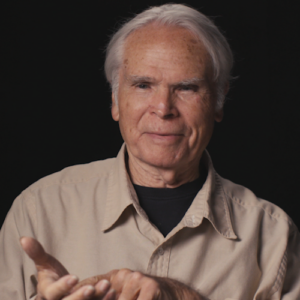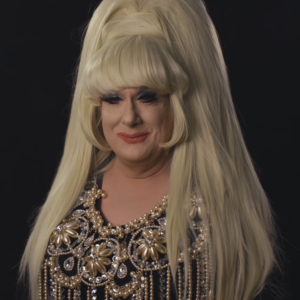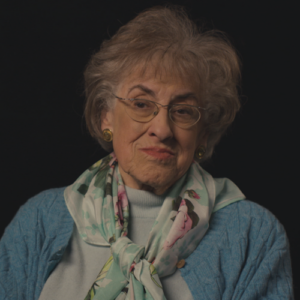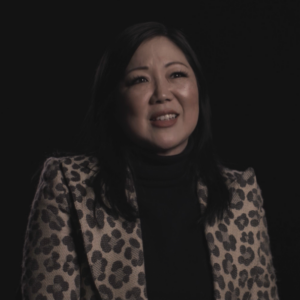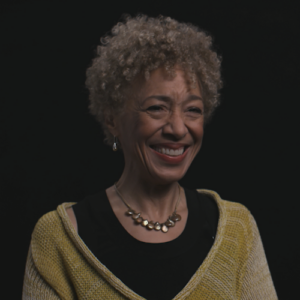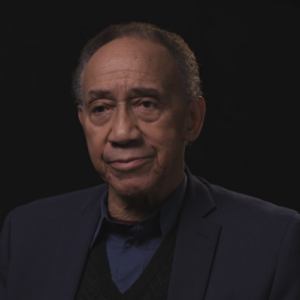Interviewer: Do you remember being introduced to Mae West for the first time?
Claudia Roth Pierpont: I’m pretty sure the first time the first impression she ever made on me was through cartoons, which was the way I think she came into certain people’s consciousness in the fifties and the sixties. There was a there was a mickey Mouse cartoon. There was definitely a Popeye cartoon. It was Betty Boop, I think. There were cartoons being made of her from 1935 on, but continuously. I think I can remember birds and dogs and all kinds of creatures with big lips and big curved chests and, you know, come on up and see me sometime. The animal world seemed to talk like that for a while, long before I ever saw her. Actually, in one of the movies, I think I knew that there was a creature out there somewhere that spoke in a strange way, but didn’t know how or why.
Interviewer: And so funny because we haven’t really seen many of these cartoons.
Claudia Roth Pierpont: Oh, there are a lot. There’s a Popeye cartoon where she’s not an animal, where she’s a seductress. But now it offends me a little bit because she gets into a fight with olive oil over Popeye. And I know Mae West would never fight with another woman over a man that was that would be against her principles. We misunderstand her completely if we think she’d knock out olive oil to get to Popeye.
Interviewer: So she was playing. What was the persona in the cartoons? What was the idea?
Claudia Roth Pierpont: I think it was just the catchphrase and the shape. Big curved bosom, even on a robin or a wren or whatever. The little bird or a duck, lips batting eyelashes and come up and save me some time. That was it. That was it. It didn’t go much farther than that. It was just something everybody knew. And it made its way into cartoons, which suggests there was something very cartoon like about her to start with.
Interviewer: Yeah. I mean, and then about ultimately, eventually at some point, you saw a movie of hers. What is the impression that that what is the how would you describe the persona that she was putting on film?
Claudia Roth Pierpont: I think she was a woman with great gusto for life who could laugh at everything and who most of all was not going to let anyone, especially a man, bring her down. She was confident, self-sufficient, proud, tough, streetwise. She was anything but a dumb blond, although she was sexy and about sex. But she was smart. And I think that came across very strongly to everybody who saw the movies way back when. And certainly to me seeing them decades after they were made.
Interviewer: Yeah. I mean, of all those things you just described, what do you think what aspect of her persona was the most revolutionary?
Claudia Roth Pierpont: Well, her attitude to sex was her subject. So that was the revolution that she addressed it straight on. And it wasn’t just sex as Eros, it was sex as power between men and women. And she addressed that head on. One of the lines I love, I think maybe the central line of hers about this is from She’d done a wrong and it goes back to her play Diamond Lil. She’s comforting some woman who’s been undone by a married man. And she says married are single men all mineral alike. Married are single. It’s their game. I’m just smart enough to play it, though. That is a stunning thing to say in 1933. So there’s a if you were listening, if you’re not just laughing along at the jokes and the hand on the hip, she’s got a message for you. And I think it was a very real and very revolutionary and still is.
Interviewer: It’s a little weird that it still is revolutionary. I mean, this is like 85 years later. Why?
Claudia Roth Pierpont: Because we’re not up to her yet. Because she was telling us more in 1933 than we’ve managed to do. Well, because she wrote her own scripts and we can’t necessarily do that in everyday life. But I’ve been thinking about this lately, and I wonder if we would have the need for a MeToo movement if women were properly schooled in the Midwest School of Life, which is Do not ever let a man take advantage of you or use you find a way to outsmart him and just don’t let him bring you down. Now, not that that can be done, not that that’s an easy solution, but that’s the ideal.
Interviewer: Well, we’ll get more into that in a minute. But, you know, this idea that she’s she’s putting on this persona of a of a very sexual, sexy woman. Do you think she was desirable or was she playing desirability?
Claudia Roth Pierpont: She was playing the most exaggerated, delirious, gorgeous idea of desirability as she was not a particularly beautiful woman. She didn’t play it for beauty. It was all for laughs a little bit. It was always a bit of a send up of. Desirability. You don’t open a movie with a great closeup of her face. She wasn’t Garbo, she wasn’t Dietrich, and she knew it. If you watched all of these movies, pretty much they begin with a build up so that you’re told what you’re going to think of her before she shows up. Oh, men are all looking at some nude portrait of her in the first movie, The Most Beautiful Woman in the World. Or there’s a carnival barker yelling about her. And I’m no angel. The something like the flower of feminine pulchritude, The girl of your dreams. So and then the men will react, you know, goggle eyed and astonish. So we react to that, to being told what to think. Oh, she wasn’t. I mean, before she was Diamond Little before she went to the movies, when she was on the stage in the costumes of the era as a flapper, you can read reviews of the time. And they said, Well, she’s a pretty plump flapper, isn’t she? She didn’t have the body type of the time at all, which is thin, straight, hip, flat chested. She was kind of a revolution just in her, as they say. And I’m no angel. Feminine pulchritude.
Interviewer: Yeah. And how does comedy I mean, she kind of evolved through comedy through her career, but how did she sort of realize a comedy could sort of be weaponized or used in particular way?
Claudia Roth Pierpont: That’s a great question because she starts out very serious and sex is her subject. When she starts writing plays and she writes a play called Sex in 1926 couldn’t be more obvious. She wanted the title of the play put on the roof of the theater in lights, but she couldn’t get that done. But it’s not a comedy. It sounds funny, but it was actually a play about an angry prostitute, and it had serious issues about men and women and power and women being angry. But what did it get her? It got her some notoriety. It got her arrested. It got her ten days in jail, which doesn’t sound like much. And she used it for publicity and it worked in her favor. And she made lots of jokes about underwear in jail and the warden taking her to dinner. But in fact, had she continue to be arrested, as she well would have been considering what she wanted to write and what she wanted to say if she had had future arrests on morals charges, chances are she really would have gone to jail really seriously. It wouldn’t have been a joke. I don’t think she could have mapped out her future that way. And the aha moment of when she realized I can make it funny. I think it’s one of the great lightning strikes in our entertainment history, and I think most people think it is through watching Drag. She had grown up watching drag queens throughout vaudeville. She’d played on bills with them. She played with the great Burt Savoy. Edmund Wilson wrote about parts of why people adored him, people living things. Some of her lines may come from him. And she wrote a show called The Drag, which was the first show she wrote Without a partner. And it was just for drag queens. It again had a social point of view about homosexuality and tolerance, but it climaxed in a drag ball, which apparently went on for 20 minutes or half an hour with guys swanning around in boat boas and gowns and makeup, looking and sounding very much like Mae West, who had not yet actually been invented as Mae West by that point. So that seems to be the eureka moment, because out of that comes Diamond Lil. That’s the next thing she writes. And it seems to be the way she got it to be. Funny didn’t change her message, but got it to be funny so she could get away with it.
Interviewer: Can you sort of go back to sex and talk about how how she what kind of anger she’s expressing, what she’s trying to do with that.
Claudia Roth Pierpont: Play in sex? As far as we understand it all has been published. She’s a lower class prostitute who finally does fall in love, but she’s been a prostitute and abused by men all her life. She has a speech which says something like, I’ve hated men all my life. They’ve badly used me. They’ve taught me to be this way. And she’s trying to reform, and she ends up having to give up the man she loves because these are the way melodramas end. But it was a it was a social protest play, if you will. There was a humor in it. She still had spunk and humor. And it wasn’t. She naturally tended toward humor, but she had a message to get across. It’s a startlingly serious document for what we think of as Mae West. And it just it did work in the sense that she got notoriety for it. People certainly knew who she was. It ran for a while, but it ran for a while based on reviews that said things like this place should be reviewed by the Board of Health, not by a critic. This stuff is from the sewer. This is outrageous. This is so horrible. Of course, people flocked to see it. There were lines outside the theater every time somebody condemned it for being too dirty. This is not the way we talk. These are not issues. We talk about either sex or underlying that the power that that the sex games were about between men and women. Because, I mean, she loved the persona that she then adopts as a woman who loves sex and. That is true. She loves men. One. One is as good as another. But that’s also about power. That’s about not having one man have any power over you. All of these things are underneath this. And I think I think they can be heard very clearly. I think they were heard very clearly. And I think it was all considered pretty dangerous stuff.
Interviewer: And what do you think she realized about anger? How did she see that? Not really getting her point across in the same way that humor could?
Claudia Roth Pierpont: Well, as she risk going to jail very seriously for what she was doing, nobody was laughing. I think if you just look at the kinds of lines she uses when she writes Time Diamond Little, and it’s watered down a little bit in the movies, but not that much. You know, it’s very funny to say, never let a man put anything over on you. Accept an umbrella. Ha ha. It’s a funny it’s actually a vaudeville line. But when you get enough of those starting to accumulate, you get a lot of advice being given to women in some of these in some of these movies. And the laugh was it worked. It made her a star and which which she also want. And she wasn’t just out to be, you know, Ibsen. She wanted to be a movie star. And it worked. And she had huge success, but she was still getting it across. Women were flocking to these movies and they were hearing something I think, that they liked very much, and it was something of the time. It isn’t just latter day academics seeing this stuff. You read Colette, who is seeing these movies in the thirties in Paris, and she says something Aside from just loving her and loving her physicality and her humor and her timing, she says, Mae West is the brave enemy of the male That’s in the thirties. So she’s picking up. I mean, you might have said that about the play of sex as a drama. That’s what she was. Not so much the interview, but someone is going to play the game and outsmart them and get her own back. And this message was still coming across, but people were loving it. She was rich by 1935. She’s what, the most the highest paid actress in the country. And she’s still telling them the same story about sex and power. But everybody’s laughing and they’re loving it. It’s literally you put the sugar in the medicine and it goes down.
Interviewer: The second the second highest paid person, a.
Claudia Roth Pierpont: Person right behind. What is it, William Randolph Hearst.
Interviewer: What do you think she took? And I just I want to go back to the drag queens thing. What do you think? First of all, how was she exposed to drag queens and what did she see them doing that she sort of adopted?
Claudia Roth Pierpont: Drag queens were a big part of vaudeville. There were just lots of them on the bill. And she was in bondage. From the time she was six years old. She would have been exposed to this. Who knows when people have traced the actual bills that she was on in the theaters. And they do know she worked with Burt Savoy, who was one of the great, great drag queens, one of the songs she sings in My Honkytonk Woman. I think the guy who wrote the lyrics says it was first written for a drag queen. I think it was Julie and Elton, and she was a very big drag queen at the time. They were popular entertainment. They were funny. They looked like Mae West. They were lots of rouge and giant feathers. They exaggerated femininity the way she did. They made a teasing mockery that was also gorgeous about what it was like to put on the artifice that made you a feminine woman. This is all incredibly close to things that very serious feminism is about in the 20th century. You can hear later, you can hear Simone de Beauvoir saying, You’re born a female, but you become a woman. You’re taught how to do these things. When you see Mae West coming on with covered in rhinestones, with a feather in her hat, that’s three times the size of her head. It’s the same kind of joke about femininity and desirability and how you put it on, and in her case, how you put it over on the men as she is making fools up and from whom she’s getting her own power back. That’s the game she knows how to play.
Interviewer: And the dress, the humor of the drag queens. Was there something in that double speak, The double entendre?
Claudia Roth Pierpont: Oh, there were lots of double entendres, of course. I think even come up and see me sometime, which isn’t really the exact line, but I think even that is traced back to one of the great drag queens, maybe even Britt Savoy. I think it’s come up and come around and see me. There are always invitations, sexual invitations and the dearie dearie this and dearie that. That’s right out of drag. I think somebody at some point called her the greatest female impersonator in history, and she knew about it. And she said, Well, I take that as a compliment because it was what she was about. She had she was fooled by what I mean. She she wasn’t foolish about what she was doing. She knew exactly what she wanted to do.
Interviewer: Well, let’s go back because you mentioned her mother earlier. How what role does her mother play in and sort of pushing her into the spotlight?
Claudia Roth Pierpont: Her mother is crucial, she says herself. And many people who are around her said her mother was the love of her life. Her mother was a German immigrant woman who moved to Brooklyn, had this daughter and did the most American thing of the time. She fell in love with show business, especially vaudeville. And she wanted her daughter to be a star. She was the ultimate stage mother. Mae West seemed to be on stage by the time she was six or seven. She says it was her mother who taught her how to deal with men because by the time she was a teenager, men were becoming boys or becoming distracting. And that was the last thing her mother wanted. But she knew she couldn’t keep her away from boys. So she taught her have lots of them. Just don’t have one. One was dangerous. One would take her off the stage. One would take her attentions away from her profession. She said it was her mother who taught her how to concentrate on Mae West, as she later said, referring to herself sometimes in the third person that is on her career and what she wanted to achieve. Don’t be distracted by a man. But then when she finally finds this persona, this 1890s, gorgeous, exaggerated, hourglass shaped woman, her mother is a lot behind that image. She was born in 1893. So this was these were the years when her mother was in her glory. Her mother was supposed to be a beautiful woman, worked as a corset model. According to Mae West, her mother had wonderful tastes, and it said that her father called her mother. Her mother’s name was Tillie. Called her champagne, too, because of her tastes. And Mae West’s first realization of the character that we think of as Mae West was initially called Diamond Till, and then it became Diamond Lil. And then for the movies, Diamond Little had such a tawdry association that they couldn’t have that. So she became Lady Lou, and she’d done a wrong. But you trace it back, you get an image of her mother. And not only is her mother is, the figure shows some influence of drag. When I see it now, knowing this about her mother, I can’t help but see a little girl looking at the most glamorous woman she has ever seen, putting on rouge and feathers, ransacking her mother’s closet for the clothes and recreating her mother with the kind of dazzled eyes that she that she must have looked at her with. Because Tillie Tillie was was apparently that kind of a woman.
Interviewer: But it’s funny because you think of a little girl dressing up. That’s what they do. They put on.
Claudia Roth Pierpont: Everything you can find in the closet, in the jewelry box. Too much rouge, too much paint. You sashay around. It’s a send up, but a very admiring send up. A sweet natured send up of femininity.
Interviewer: Yeah. I mean, I think you say or someone says her mother was probably her first and maybe only real love of her life. The one thing that sort of comes across in her life is sort of this dedication to her career and this character that doesn’t really display emotion. Right. Can you talk about that sort of sort of shunting aside of human emotion?
Claudia Roth Pierpont: It’s not as though she doesn’t feel things. She’s not cold or clothes down. She’s much more vital and warm and interesting than that. She gives you the feeling and she has the lines that sometimes let you know that she has been through it, that she has felt emotions, and that she’s learned to conquer it, that she’s learned to play the game, that she won’t let herself feel anything that takes her down or weakens her. She’s got a line somewhere, it must be. And she done it wrong, which is there was a wolf at your door. It was not only at my door. He came into the room and had pups. You know, she’s had she she comes from she’s street smarts. She comes from a hard background. Even even her character lets you know that she’s not highfalutin. She still says, ain’t she? Maybe has had experiences with men that she’s learned to overcome. Nobody’s going to fool her again, is the feeling that you have. I think she she’s not unemotional. She’s just learned to control her emotions so that they never undermine her or take her down.
Interviewer: That’s great. Can you paraphrase or even quote that famous shoreline I’d like to get at in this film? If you tell people the truth, they make them laugh or they’ll kill you. Is that.
Claudia Roth Pierpont: Right? If you tell people the truth, make them laugh or they’ll kill you. Well, she was telling people the truth and they they put her in jail for it. When she did sex in 1926, she was notorious, but she wasn’t rich. She wasn’t going very far except probably to another jail cell. If she kept on telling people the truth without making them laugh. And then the eureka moment happens. She discovers comedy between 1926 and 28. She’s completely transformed. Not her message, but the way she’s delivering it. People are laughing. So she goes from basically being sent to jail for what she wants to say in 1926, being the toast of Broadway in 1928 to being the highest paid actor. Trust in America by the mid-thirties because you learned to make people laugh.
Interviewer: In your mind. Was she? Her character is meant to appeal to men or to women.
Claudia Roth Pierpont: In the film. Obviously, the pretense is that she has a great appeal, overwhelming immediate, sudden and total command over men. But women flocked to see those movies, and the movies are filled with messages to women telling them how to behave, comforting women, younger women or women who have been badly abused by a man or left by a man who come to her for advice. In one case, I think it’s and I’m no angel. She gives a woman some of her jewelry. She doesn’t know what else to do and says, I look better already. And she gives her a necklace. She’s always advising them. It’s to a young woman that she says, these famous lines, you men’s all alike. Married or single? It’s their game. I’m just smart enough to know how to play it. But the line that follows that is you’ll come to it. It’s. She’s coaching. She’s a life coach for these women who have been abused. Just trying to tell them to stand up, move on, find another man, stop suffering and get your life going and put on a necklace. At the same time.
Interviewer: Yeah. I mean, it does sort of seem to me like she’s mainly speaking to women in her movies and in her work.
Claudia Roth Pierpont: I think at one point there’s a famous line where she somebody says she’s in. She’s in the office backstage at Paramount or somewhere. I think Dietrich tells the story and she kind of produces a breath out of her and says, If I just wanted to please men, this is all I’d have to do. The rest of it is obviously, it’s it’s there’s a lot of women’s fantasy in these movies. The jewels, the clothes, Cary Grant falling at your feet. All the men in the world falling at your feet, plus your independence. You’re tough and you don’t take it from anybody. What can be better? It’s both. It’s everything. You’ve got your femininity and your independence. Yeah, of course. Women love those movies. Still do.
Interviewer: And then for men in, you know, I mean, what if then or now? What happens to men when women joke about sex? When women make sex and men a punch line?
Claudia Roth Pierpont: Well, that’s a good question. Men still went to see the movies. I think you wonder if they were hearing the full message completely or not. I love the scene in I’m No Angel, where she sings. What is it I want Honky Tonk Woman. And the the camera shows all the men just goggle eyed, loving her to pieces. And then as she goes off the stage, she says quietly to herself and to us suckers are men hearing that and knowing that she’s playing them for suckers. Were they just laughing? It’s all right. She’s funny. The message may have been just much more important to women. They may have taken it more to heart, to men. She’s another comedian and she’s funny and she’s that’s what works about her. The honky tonk funniness about her. I’m not aware of men taking offense or thinking she was frightening or that she was going to get a real revolution going. It’s taken too many years for that to happen.
Interviewer: Do you I mean, in terms of what we know about her personal life, do you have a sense that she was actually as promiscuous as as her persona presented?
Claudia Roth Pierpont: One doesn’t know, but and her autobiography was written by somebody else and be so late that the mask was in place. But it does seem that there was a reality to the lesson her mother taught her. There was a tremendous discipline in the work she did. Remember, she’s not only an actress, she’s writing the parts she created herself. And while there are a lot of disputes over how much she wrote of anything, and probably she had help and she did plays and other people did, but she certainly wrote all around gag lines. Paramount referred to her as a one woman production unit. She had to have a very disciplined life to do what she did in the years that she was moving forward, making one movie after another in charge of everything, the costumes, the music, at least overseeing everything. No director seemed to ever want to work with her more than once because she she directed the director to a degree that required discipline. She said she was married once for 5 minutes when she was 17. Didn’t tell her mother she was out touring on, you know, on the vaudeville circuit, didn’t didn’t reveal that. It was apparently just because she was afraid she might be pregnant. It lasted a month or two. I don’t think she ever told her mother. And from there on in, it does seem to have been a succession of man. Let’s say her line somewhere is, yes, I’m a one man woman, one at a time. And that does seem to have been the truth. No, Certainly nobody stayed around for years and years. That doesn’t seem to have happened. But it’s interesting that biographers and people are always poking at that issue. It’s just that we can’t quite accept the fact that there really wasn’t a long term male love of her life. It’s still. It’s still I don’t know, Greece is too much, but we’re still a little bit suspicious that maybe she was hiding something that. Can a woman be what she said she was? It’s still a little bit odd, but it seems to have been pretty true.
Interviewer: You know. Do you know I mean, do you think anything of her relationships with men is a reflection of her relationship with her father? Do you any sense of the.
Claudia Roth Pierpont: Relationship with the father is very mysterious. It wasn’t as important as the relationship with the mother. Her father was a prizefighter. She there are few negative words about him in this autobiography she wrote in the late fifties, which is odd considering that she was painting such a pretty picture of herself. At one point, she says, she says she hated his cigars. She said he had an explosive temper and that she didn’t want him to touch her. And then she has a laugh line, which is something like, well, Freud wasn’t around to tell me about it, but she goes out of her way to say that he wasn’t abusive. She just didn’t like him the way he was. She wasn’t sure her mother was well enough, matched by this rather crude man. The end of her at the end of his life, she took care of her father very decently. So it is it isn’t clear exactly if something more was going on, if there was more of a negative influence than one knows. It just isn’t clear. If there was, she got over it and took care of him. But the mother was the figure and clearly deeply loved by her.
Interviewer: Do you know anything about her siblings and how did and how connected she stayed with them?
Claudia Roth Pierpont: I know that there was a daughter born before her who died in infancy, which made her even more precious. And then two younger siblings, a girl and a boy. The sister became an alcoholic and did Mae West impersonations. It cannot have been easy to be my sister. And there was a younger brother. I don’t know what he did. I think it was Jack Junior. She brought them both out to Los Angeles. When she went out there, she said her father up on a farm, on a ranch, rather, in the San Fernando Valley. She bought adjoining places for the sister and the brother. She took care of everybody. There are photographs of her with her father and her sister and her brother at the premiere of at least one of her big movies out in Hollywood. So it wasn’t even as though she was hiding them or pretending to have nobody around her, as though she were really the Mae West of the movies who seemed just to arise, you know, out of his head with no family, no children, no parents. She didn’t she didn’t hide them. She didn’t hang out with Hollywood people. She seemed to hang out with her New York friends and possibly with her family, as she seems to have maintained some kind of good relationships with both her siblings.
Interviewer: Great. You’ve already mentioned the significance of her writing her own material, but can you just speak about that even more generally about how women in the context of women in Hollywood are women and the arts of putting for their family their own worth?
Claudia Roth Pierpont: First of all, nobody could have invented Mae West except Mae West. And no, she wanted to be an actress, right? That was the goal, to be a performer. But there was nobody who could write what she wanted to be unless you wrote it herself. This completely independent, sexy woman who didn’t want to get married, who wasn’t going to die in the last act, who wasn’t going to follow someone to the desert. She wrote this material to create material for herself. In a weird way, one of those things of Martha Graham or someone who had to create the art form for her to be a dancer in. In order to be a dancer, Mae West had to create the material in which she would shine. And she did. Whether she was a real writer, she wasn’t Henry James. We know how she worked. We know how she worked on the drag. She literally assembled people and let them improvise and have other people write down lines. But she put it together. She worked with other people’s material, but everything had her stamp on it. She was a creative spirit, even if she wasn’t what we think of in literary terms as as a as a writer who sat down and produced a manuscript that probably was not her way, even with the novels so called to probably work through a Dictaphone and then had someone else, as she said, put in the $4 words. Remember, she she barely went to grammar school. She was out on the stage by the time she was six or seven years old. So her education was pretty spotty.
Interviewer: Which makes it.
Claudia Roth Pierpont: Which makes it all the more astonishing that she did what she did. And yeah, we talk about women directors and how we’re still struggling toward that. She didn’t officially direct any of her films, but if you look at the credits, especially the early films, it’s by Mae West and screenplay Story dialog by Mae West, and she had a heavy hand and everything else that went into the movies to.
Interviewer: The point that you make in your book that I didn’t like because it points out the significance of the period of her life, which is 1893 to 1980. I mean, how good is she, in a way, a reflection of. Changes that are going on, especially for women at this in America.
Claudia Roth Pierpont: Well, she’s she is a walking revolution to start with. I don’t know that she keeps up with changes very much. He pretty much stays what she was. Which isn’t to say we’ve caught up with her yet. But I don’t see her with her eye on the feminist movement as it moves along. She’s pretty much seems to have shut her doors on herself and her persona at some point. But she gave she gave so much to be drawn from it at the start. I’m not answering this one now.
Interviewer: I mean, I guess it’s you have a line about these are women who worked out their destiny.
Claudia Roth Pierpont: All oh, transit.
Interviewer: Transition sites all the way around war. New wave hadn’t been invented. She survived this moment.
Claudia Roth Pierpont: She has a transition. But every feminist is a transitional figure. Everybody moves it another step forward. So you might complain. Or latter day feminism. Michael, It’s all about sex. It’s all about men. Well, it had to be. Remember, she was born in 1893. This is the first door that has to be opened If you’re owned by your husband and he can control what you do and you are completely subject to a man, as many married women were all around her when she was growing up. Well, the other doors that might be open hardly matter. You’re not going to. She didn’t battle for women to get into law school, it is true. But she battled on this first front to get you on your own two feet, to not be beholden, to not be subjected to any man. And that seemed to be the first thing that needed to be done. She says that the first cause that really came to her and cause it’s much too grand a word was when she was very young, a teenager, and realized the double standard that all the boys could go out and be as sexually active as they wanted. But if the girls did it and she very much wanted to do it. They were ruined. They were bad. They had no reputation. This is something she chips away at in every movie one way or another, whether you’re aware of it or not. There are always lines about it. There’s some I forget which film it is. Maybe it’s better than I do. Somebody is complaining to her about, Oh, I’ve had an affair. I didn’t know he was married and now I’m ruined. Nobody will want me. And then she has that great line. Well, when women go wrong, men go right after them. You know, it’s funny. It’s vaudeville, but it’s also saying something about undoing a double standard. So I think she would. There’s so much to unpack from these films in terms of later issues.
Interviewer: It’s interesting because we can learn about, you know, she pushes the envelope forward, but in censoring her, the censorship that the story of censorship shows us how prudish we are. Right. What can we learn by looking at how people are American? You know, censors reactions to her and her career?
Claudia Roth Pierpont: Well, she was severely censored, especially after those first two movies. It’s astonishing to think of the things she couldn’t say, like, I won’t lift up my veil for that guy, I think. But but the thing about her is she knew was that she can make anything sound dirty if she wanted to. So they had a hell of a time censoring these scripts because they would take all the words out and she’d sort of put all all the double entendres back in and lines that were perfectly innocent. We do think it’s preposterous. It seems ludicrous that in 1935, I think the first two films were banned. They refused to rerelease them. I don’t think they were shown again to the late sixties. But this makes me wonder if something you haven’t brought up yet about her later films and Mae West in Old Age. And I think that may be a place where we still have a lot of problems that we can’t even admit. We’re up against a taboo that we hardly recognize ourselves about what happens to a woman when she gets older, and that we can be very disdainful of people. In 1935 not being able to deal with a woman who looks like she did then around 40 years old, looking still pretty terrific, being sexual, openly sexual, enjoying it. They said they didn’t want to take out any mention of sex. They just didn’t want to make sure she seemed like she was enjoying it or making money from it. And so that seems comical to us. And they’re provincial and old fashioned, but I think we have some of our own problems and own attitudes and facing some of the stuff she did later on.
Interviewer: It’s interesting. It’s true. I mean, there’s almost like a social censorship that’s going on now. It’s not official, but we just don’t like to see older women.
Claudia Roth Pierpont: Exactly. Sexuality. Exactly.
Interviewer: Well, before we get there, let’s build up because so she her film career sort of peters out in the forties.
Claudia Roth Pierpont: Yeah. She’s she’s centered just down to nothing. Yeah.
Interviewer: Yeah. I mean, do you think that she would have if not for censorship had it kept being successful?
Claudia Roth Pierpont: It’s hard to say because she was one of these stars who was not going to change. She wasn’t going to play anything but what she was. And a certain point that probably just gets a little bit stale. But the censors certainly hurt tremendously. They really took the sting out of. All those late movies. And once they started chopping them up, the movies don’t even really make sense anymore. You’re really there just to be with her, to watch her move through a story that it doesn’t matter, that it makes no sense. You’re just laughing with her and you’re happy to be with her because she’s such a great presence. It’s hard to say if she would have gone on. Had she been willing to change, she would have gone on. There’s the famous story of her turning down Sunset Boulevard when she was in her fifties because she told Billy Wilder she wouldn’t play a husband and she wasn’t old yet and she could still pass for 26. And did she believe that? Hard to know. Maybe she could pass for 36 on stage because she went back to the stage at that point when there were no more movies to be made and played her old plays, played Diamond Lil for years, traveling around, and she could pull that off. But that’s a bit of a tragedy that she froze that way after she’d made this great contribution and really didn’t seem to want to go on and do something else.
Interviewer: Well, what do you make of the fact that she was 40 by the time she got to? I mean, was the nature of her act such that her age almost didn’t matter at that point in the thirties when she.
Claudia Roth Pierpont: Well, first of all, how old is 40, young lady? Well, she just had worked in vaudeville. I mean, she’d been working for years. It’s interesting that it took her as long as it did to come to this eureka of make them laugh. You know, she had not that she hadn’t been making them laugh in vaudeville. She’d been writing skits. She was she was funny. She was a dancer. There were all kinds of incredibly funny descriptions of her shimmying and doing whatever, a muscle dance in a sitting position, whatever that is. But putting it all together into this character, it seemed to have just taken her years of working through different things. It took her, you know, the influence of her mother, the influence of drag, the black music that she used. All of these things went into this pot and seemed to some she steps out, you know, covered in rhinestones and fantastically funny. And from there on in, everything is said. It just took her a long time to do it. She’s nearly 40. She she looks pretty great for that. She’s as I say, she’s no conventional beauty and she doesn’t play it that way. No conventional beauty needs 40 men to say how beautiful she is before she shows up on the screen.
Interviewer: It is very young, by the way. Yes. So she she goes to Vegas in the fifties. Well, why is Vegas a venue that would be appropriate for her, her act?
Claudia Roth Pierpont: Vegas was perfect for her by then. She had no movie career. Vegas is vaudeville, renewed and rerate. It had just started going in the early fifties. I think the sands opened the Sahara opened in 52. She’s out there in 54. She can do a vaudeville act. But she claimed she was doing an act for the women. I think she called it the first bare chested act for women in history. All the men had the girls around them, you know, the showgirls and the dancers in their scanty clothes. She wanted scantily clad men. She got them a bunch of bruisers who would carry her on and stage muscle bound men. She thought she was putting it on for the women, or so she said. She did her old songs. It was like it was perfect for her.
Interviewer: And who was her audience?
Claudia Roth Pierpont: Her audience then shifted significantly. Her audience became really gay men at that point, and she had a sort of renewed career isn’t the right word. There was a renewed interest in her as the campy gay icon, and she had that early on, also in a different way because she took from drag and give back to drag. Now she’s she’s she’s an interesting figure for gay men because of this sort of new kind of campiness she seems to represent in her later years. And it’s complicated. And I took your question to heart, and I think I’ve changed my mind from what I thought about it when I was younger 20 years ago or so. When you look at a woman at that point, she was 60 and then she goes on and she’s even older when she’s making films in which she’s a sexual woman, she’s 17 or seventies, and in her eighties, by the time she’s done and I think when I was younger, I thought, where is her dignity, isn’t she? Or where people are starting to laugh, not with her, but at her. And that hurts me for her. And I feel her is in her pride wounded. I don’t think it’s possible to know what she felt about whether people were laughing with her or at her. At a certain point, we can’t get inside her. But I’ve come to feel a little bit differently about it now that I’m looking at it again. And I think, Well, what’s wrong with that? Why is it horrifying that she’s out there at 60 or even 70 and being sexual? I mean, she’s parading it in the same delirious over exaggerated way. She always paraded sexuality. So that’s always going to be comical and funny. But why aren’t we with her in it any more? And it seems. To me that maybe we’re looking at one of our last taboos, that we will not let this older woman be sexual without recoiling from it. We can just have a good time with her. And I look at her and I think, well, she was having a good time. She was enjoying herself. It’s dignity. Everything I think of her. Her old Paramount studio friend, Marlena Dietrich. And they were pals. They were making movies at the same time. And Dietrich was a great beauty. But in the last decade of her life, she basically shot herself up in an apartment in Paris and wouldn’t let anybody see her. Even her best friends see her because her beauty had faded and that was something she couldn’t face living with. So I look at Mae West. She’s the other extreme. But I want to say, well, she’s out there. She’s having a good time. What does it matter if people are laughing? She’s out there. She’s beating down another taboo and she’s living the life she wanted to live. And if she knew we were laughing or people were laughing, she either didn’t care or didn’t know. It’s hard to say, but at least she was out there living. And I think you have to hand it to her for that.
Interviewer: Why do you think this is the last time? Why is this something we can’t get over? That?
Claudia Roth Pierpont: I don’t know. We’re just not up to it yet. We’ve been fighting a lot of fights along the way. Women. And this one, I think we just haven’t reached out. I don’t know. Maybe there’s something biological about it, and it’s just a universal. I don’t know if it’s strictly cultural, If it can be overcome. Hope it can be overcome. I was I was trying to look around at other places or that’s discussed. And somewhere other in Dickens, there’s a line that goes, She was an old woman who managed to look like a young woman with a ravaging disease. So there’s this kind of mockery about older women trying to look young. Then you go over into the other kind of camp, the kind of camp that isn’t intentional. That is something trying for something very serious and failing and people giggle at it and she falls dangerously close to that. But again, I feel resistant to just considering it that that way and stopping part of me at this stage with so much celebration of gender fluidity and people deciding what they will be and how they will present themselves to the world, I think. Why not an older woman? Never mind. I know an old a frankly, old woman. Why not? Why is she? Why is she not permitted this? And I think she isn’t by most people’s intuitive account at this point, by their intuitive take on the situation. I don’t know why it is. I don’t know.
Interviewer: I think there’s something difficult about being strong and embracing and being confident and embracing who you are and visibly attempting to be right. Those two things don’t match up in our head. Right. The dignity goes.
Claudia Roth Pierpont: Yes, I think you’re right. You’re trying to be something you’re not at that point. And that seems pathetic. But what if she’s not trying to be young because she doesn’t look young? I’m not aware. If she had work. I’m not aware of it. Maybe she did. She probably did. But there’s no way she looks young. What? She looks as like an old lady with the same kind of platinum wig. She always wore a wig with the same kind of too much makeup. But that’s. That’s the shtick from way back. That hasn’t changed. What’s changed is that she’s old. Also, the wit is gone. There are reasons you just don’t like the act. All of that is gone. But to look at the core issue that she was presenting about a woman being sexual, what she presented at the start of her career, which caused the revolution to begin with. Now that she’s old, it doesn’t work. Maybe it wouldn’t work for men either. Could Rudolph Valentino had done this in his sixties and seventies? I just I don’t know. But it seems to me there’s a real. She’s just not. Women are not permitted to this. And why not? Exactly. Not that everyone would want to run out and do Mae West at the age of 60 or 70. But there are lines by Colette and I think Simone de Beauvoir and Germaine Greer in our own period that talk about, well, how does a woman get old? What do you do? And there’s a phrase, I think it’s sexless dignity. And Germaine Germaine Greer writes about being released from sex when you’re older. Quite a relief. I have a lot more time now, and that’s fine. If that’s an option, fine. But why is that the only option? Why isn’t what Mae West was doing an option? Because other people will laugh at you. Is that the way you decide how to live your life? I’m. I’m. I’m sorry for her. Partly because she wouldn’t change. But part of me still wants to take off my hat to her and say, you just go and do what makes you feel good and what you want to do. Why not? Why not? If that’s the act you want to put on and it makes you laugh and it makes other people laugh. She had a big gay audience.
Interviewer: Do you? What do you think about. Do you see any parallels here with anybody in our current popular culture? Oh.
Claudia Roth Pierpont: I guess in a superficial way you could say Madonna on the sex, and especially way back when with desperately seeking Susan when she seemed a bit more of a outre character or maybe Lady Gaga with the clothes and the camp and the glamor. But I don’t think anybody’s also delivering the kind of wonderful message that she was delivering at the time or being so funny as she was at the time. I don’t see anybody exactly like her. You can see bits and pieces and different people and maybe she was necessary for these other people to come along.
Interviewer: But in terms of pushing this female sexuality in an older woman, Madonna is probably the only person doing that. I mean, she gets it.
Claudia Roth Pierpont: She does she get grief for it. So I’m just not informed. She gets a lot of grief for it.
Interviewer: But it’s complicated because a lot of it is due to plastic surgery. And so there’s judgment around that. Right. Complicated, Right. An attempt to not be old.
Claudia Roth Pierpont: You mean out when she’s out in public? This is not about the way she looked in films or performances. Yeah. You don’t want to get caught. Cronk desperately trying to be young. That’s embarrassing. You want to have the gravitas of your age, I guess. And yet, why is being sexual only considered being young? I mean, that’s a problem that it’s sort of a knot of problems. You have to sort of pull all the threads out to say, well, why can’t she not have facial surgery? And this will this raises a whole other question about what it means to be an older woman, to just be an active part of the world you’re in and what you have to do to preserve to preserve your role in the world, the games you have to play. This is still dancing backward and in high heels to bring in another movie star. The care you have to take with your appearance, the way you have to look, the way you have to please. But this was me with him all along, you know, Put on the jewels, but play the game. But no, You’re the smartest person in the room at the same time.
Interviewer: I want to go back to the MeToo movement because our last interview said something interesting about how, you know, in a weird way, by sort of taking on this male persona and being the sort of sexual predator, there’s a way in which maybe Mae West isn’t exactly the model that we want to look to for, you know, around the MeToo movement. If we’re not saying so, she start playing men at their own game, but we’re saying the game is horrible. Right. So.
Claudia Roth Pierpont: Well, Predator is a very hard word.
Interviewer: I don’t mean predator, but how do you think she figures into the current era of.
Claudia Roth Pierpont: Well, everything can be interpreted so many different ways and will be. And one fears the introduction of words like Predator. And anybody can judge or take offense or accuse, but it seems to me, A, it’s comedy. B, she’s not a rapist. She invites him to come up and see her. She doesn’t force him to come and see her. She doesn’t put a drug in his drink. When he comes up to see her, she merely tries to make herself completely irresistible and give the consent to males. I will emphasize in her life the best time they can possibly have because that’s what she wants to. I think it’s all in a good spirit that the fact that it is sex central, I think, can get people up in arms. But they have to remember, she was born in 1893. This is battleground number one. It’s Sex Central because most women at that time had exactly one weapon in order to get their own back from men, in order to do some controlling. And that was sexual, that that is just a truth. And if people don’t like it, it’s it’s we’re looking at it with latter day eyes. But there are many feminists of the time who will tell you this. Women, you know of the turn of the century will tell you this is all you can do. Men have all the power. How are we going to get so how are we going to control the men? They weren’t running for president. You know, we’re graduating from law school. The way to do it was to marry and manipulate or to control. And most control came through sexuality. And this is Mae West going off a stage, singing her number, looking at all these men, leering at her and whispering to herself and to us suckers, because that is what she was talking about. So there is a reason for it being about sex. That is not just about sex, it is about women getting their own power back by the only means available to many women, never mind a woman who didn’t even graduate from grammar school and lived in the vaudeville circuit. It was. It was her. I don’t want to say it’s a metaphor that’s much too fancy, but it was the way it was done.
Interviewer: Yeah. I mean, and sex was her primary focus, but along the way, she touches on class and race class.
Claudia Roth Pierpont: Absolutely. Absolutely.
Interviewer: I mean, basically in all of her movies. She never plays a high class woman.
Claudia Roth Pierpont: She never sounds like a high class woman. She would have had to completely redo her act to sound like a high class woman. She didn’t want to. I think she was very proud of where she came from and the fact that she made it up. She was from Brooklyn. She was from Bushwick. She wouldn’t recognize Bushwick today, but she that is part of her story all the time. She had a slight resentment of these fancy so-and-so’s who she knew judged her for what she was in real life. As I said, she didn’t hang out with the Hollywood crowd. She came she hung out with the boxers in the, you know, the Bowery types who came out from New York to be with her. I think she was true to her origins. And that’s kind of beautiful, too. She sounds like it. She never tried to, you know, create a fancier, fancier way of speaking. I’m getting up, getting the better of the social swans who look down on her. That’s a huge part of the fun. In some of these movies. Class is very much, very much about it.
Interviewer: And how does she what is she doing with race in her films? How is she putting forward sort of some progressive ideas?
Claudia Roth Pierpont: Well, she loved black music. She’s a broad term. All of her early songs, all the ones she made famous were by African-American composers. You look up, you try and look up the most famous version of some of these songs, and you come across Bessie Smith. The way she delivered them. She she said she was really revolutionized by seeing black performers dancing and singing in Chicago while she was on tour in the South Side. At some point, she brings it right into her movies. Whether people recognized it or not. She even breaks breaks with the right period. She’s in the 1890s, but she’s singing songs that could only have been written 15 years later. She’s singing blues numbers. One of my favorite things in her movies is when in her third movie, Belle of the Nineties, she has enough clout to finally get the studio to hire Duke Ellington and his orchestra, and they don’t want to do it at first. It’s too expensive, but she’s a big star now. She gets them and you can see them on the screen. You can see Duke Ellington on the piano playing. I think she’s singing Memphis blues and it’s a tribute. I think it’s her way of saying, this is where it comes from. I know I’m white and I know I got this platinum wig on my head, but this is where it comes from. And there’s another scene right after that where she sings troubled waters and her face is kind of ghosted over a black prayer meeting, revival meeting. And I think it’s a strange thing. It’s a beautiful scene. The cinematographer was Carl Strauss is a really serious cinematographer, and he makes it just gorgeous. And it does seem to be a tribute to the fact that black music had become American music at that point. Everybody was singing. This was was singing it, playing it. You know, Harlem had become this had become America. And this is her way of saying, I mean, appropriation is what everybody will scream. And of course, she was appropriating that music. But this is her way of saying, look, this is where it comes from. These are the people who we owe it to. Seems to me it’s funny.
Interviewer: Yeah, that’s a really interesting scene. We sort of thought maybe this film was censored or something because the scene makes no sense.
Claudia Roth Pierpont: That scene was cut in England. I know. Who knows why?
Interviewer: Yeah, but was there some reason for it other than Charlotte showcasing?
Claudia Roth Pierpont: It doesn’t seem to be a scene. It puts her out on the balcony. It camera could have stayed on her the whole time. There’s a little prelude to that scene where she’s with her maid and the maid is going off to the prayer meeting. And you notice the character we have has a heart of gold in her way, too. She gives the maid a diamond bracelet to put in the basket at the prayer meeting. She says, And don’t bring me back any change. And so we know where the maid is going. We know this is taking place. It’s slightly set up in the plot. She had to want it in that movie desperately because she controlled everything that went into those movies. And she was always the central figure. That’s why nobody else of any stature wanted to be in her movie. Once Cary Grant was a star, he was out of there because she was the central figure. So why isn’t she all alone on the balcony? It can only be because this meant something to her to have this strange scene playing back and forth, obviously speaking to each other.
Interviewer: What do you make of the scenes with her maids?
Claudia Roth Pierpont: The scenes with her maids are embarrassing today and sometimes excruciating today. But that is because I think, to be fair to her, all of these stereotypes come out of vaudeville. There’s also, frankly, the Jewish lawyer in one of the movies. If you’re an Irish cop, you’re going to have a certain stereotype. She’s a stereotype herself. All of this comes out of vaudeville, and it’s hard to watch some of it today. You could say that she gave them jobs and gave them work and had scenes where she interacted with them. And there’s this white lady with but they’re yet her black maids. And I can understand why this does not go over well anymore. And all you can say in her favor is that it was 1930, whatever. And there really weren’t roles besides being maids for any of these actresses. This is later on. This is Hattie McDaniel’s famous plight. You know, in 39, when Mae West was more or less being watched up, what could can you play? But it made either leave the movies or accept this denigrating role. And there is stereotypes or black stereotypes and they’re not great, but they were just part of their time in a way, and they were very much inherited from what.
Interviewer: I think some people say, yes, stereotypes, but there’s a part of it where she’s interacting with them in a way that maybe was unusual, that they sort of have personal lives and she talks to them.
Claudia Roth Pierpont: That is true in a.
Interviewer: Way in which I think she makes an attempt to make them characters.
Claudia Roth Pierpont: They are characters. And I think the woman who actually worked as a maid for Mae West became a leading figure in those films. The Major maid? Yeah, she does talk to them. There’s warmth, there’s sympathy. There’s back and forth between them. There’s advice given to the black maid just the same way as there is to white women who come to her. I think the maid in the nineties says to her something about what kind of husband do you think I should have? And she says, Why does it leave the husbands alone and go out with a single man? So that that the same camaraderie exists between her, that that is for certain. And I’m sure that does reflect something about her as far as she could stretch the limits of the time. I think she did.
Interviewer: Oh, I one point you make that’s really important and you’ve already sort of said this, I think, but we can mourn her change losses or her lack of change or insistence on playing the same character, but it really is owing to her origins in vaudeville. Can you explain that? Like vaudeville, you create a persona or an act and you stay with it. Yeah. So we can criticize her for not evolving, but it’s also kind of what she was made to do is create something. I think that’s an important point to make.
Claudia Roth Pierpont: Yeah, absolutely. They think of the the think of the figures who came out of vaudeville figures like Groucho Marx, Fanny Brice. But we don’t know Fanny Brice any more. Jack Benny. These you created one persona. You had a quick time on stage. 10 minutes, maybe. Your act was you traveled all the time so you weren’t going to bore the same people night after night. You needed something, as she said, that hit them between the eyes, something that really popped, something that was exaggerated, something that was big, something they would remember you by. And then you traveled it. So it wasn’t as though you were onstage doing the same thing. You created different little playlists or sketches for the same person. And it was not uncommon for that to stick. It was It’s odd that she went into the movies and played it and played it and played it, and then it becomes kind of a plaster cast for her, I think, something she can’t get out of. But but as we say, by the time she hit the movies, she was 40. Her whole life had been vaudeville, burlesque, which she claimed she wasn’t in, but she probably was. And then the way they transferred to the legitimate stage, but it was through vaudeville. Certainly there’s tons of vaudeville and all the one liners that she’s always writing. All of that goes back to vaudeville. But none of these people changed. Groucho didn’t really change. But what are you going to do? What if you were Harpo Marx? How do you go on from there? What do you do? You know, you’re you have one thing you do, and she became this one person. What’s interesting to me is that if you look back as early as 34 and you look at interviews she’s giving, she’s talking about herself as Mae West. Well, Mae West wouldn’t do that. And it’s not because she’s aggrandizing herself, it’s because she recognizes that there is this creature called Mae West, and she is create it. It doesn’t have another name the way some people did. It was completely identified with the actress, but it wasn’t her. It was this creation, this little myth she’d built and she had. And she knew how it worked. She knew that the roles are never reversed. This person never suffers. This person never doesn’t come out on top. These are the rules for maintaining Mae West. It was a creation of hers, and she was proud of it. Yeah, but she couldn’t get out of it.
Interviewer: The thing that’s so interesting about it is that the creation happened immediately, like a lot. And you think about these things as something evolves and after 20 years there’s this. But, you know, 1933, her first film comes out that same year, a film comes out with a female impersonator doing Mae West in that film. So what? I mean, how would what can we say about the speed at which she becomes this caricature.
Claudia Roth Pierpont: That she hit very hard, that everybody was excited about her and who she was? She didn’t look like anything that was around at the time. Think of what women looked like at the time. There’s also in 33, I saw a cartoon with Mae West telling Greta Garbo, who’s all slouchy and skinny and tiny and sunk, and she was saying, I’ll do some exercises, dearie. It’ll help you. Something like that. She didn’t look like anybody ever before. She was easy to caricature because she was so exaggerated. But people loved her. And the. Anything is important to women really reacted to that body to to what had become considered a kind of déclassé shape, just a motherly shape. You had to remember this. These are flappers who were around who were who were setting the fashion style. You had to be narrow hipped, flat chested, straight up and down. You had to have the body of an adolescent, basically. Women were so relieved that here was this full bodied woman who was presented as sexual and glamorous. There’s another wonderful line by Colette When I’m No Angel comes out, she says It is a violation of principle for Mae West to lose weight. This was this is freedom in a way. It involves a corset, strangely enough. But maybe having a corset is better than having to diet down so far that there’s nothing for a corset to hold in.
Interviewer: I don’t know if you can answer this, and it may just be because, you know, she was active in the thirties. The people we interview love her and love that we’re doing this project. But so few young people know about her, who she is and what have you. What can you can attribute to the fact that she’s been sort of lost in this?
Claudia Roth Pierpont: I don’t know if young people know anybody from this era. I remember when there were video rental stores a while ago. I went in and asked, do you have a section in W.C. Fields? And they said, Was that a director? I just think young people are in their own time bubble. And who do they know? Maybe they know Chaplin just because that name resounds, but they do. They know what he did. I just think that far back in film history, unless you are really interested in it as a student of it, I don’t think people know who she is, but I don’t think that’s specific to her. I wonder who else from the thirties know would ring bells in the minds of the young.
Interviewer: But but her, as seemingly more than any other actress for sure. Seems like so many people should know. Yeah. Why? Why do you think?
Claudia Roth Pierpont: Well, maybe because she stopped so young. You think of somebody else who started at the same time Katharine Hepburn. It’s fascinating to me that this is what women looked like in 1933. You’ve got little women, and she’d done it wrong. You’ve got these incredibly imaginative, bizarre versions of femininity, femininity, this neurotic, slender, intense, modern. She was considered very modern, extreme and Midwest West with all this lush amplitude and this comedy and this sexual swagger. There was such freedom in feminine types, and then it all gets shut down. And then because Mae West doesn’t change, unlike Katharine Hepburn, who is willing to change and is an actress in a way that maybe Mae West isn’t, doesn’t want to be an actress, wants to be Mae West, she stops. Had it gone on. I mean, I think everybody young knows who Katharine Hepburn is, although her first movie came out. Big movie, you know, right around the time of Mae West. But she kept going. The fact that Mae was stops 1940, it’s 39. Really, It’s over. It’s a very short career with very few films.
Interviewer: Why should women today know about her? What lessons can you learning about her in her act? What could they impart upon?
Claudia Roth Pierpont: Well, I think we’re still catching up with what she had to say, which was about men. It’s their game. I’m just smart enough to play it their way. And she. She could be speaking to us by saying you’ll come to it. Isn’t that what we’re talking about right now? Isn’t that what we’re coming to terms with right now? How to play the game their way and get your own back and not and not let anybody roll roll over you or hold anything out over you. She still has a lot to tell us and make us laugh while she does it in that way.
Interviewer: Yeah. I mean, the one, you know, Did you watch the the Myra Breckinridge clip? I did. Okay. So it’s funny because as you said, you know, initially we sort of thought, oh, this is weird. But think about that sequence, that song as I’m watching it.
Claudia Roth Pierpont: What was the.
Interviewer: Song? It’s like hard to handle. It’s like Otis Redding song. I had a black thing and I was kind of like, It is amazing that she’s in the seventies and she’s fully in the seventies genre film and she’s making it work. This is somebody who starred in vaudeville. Yeah. Yeah. Idea that she could transcend time like that, right? An amazing feat. Right. So it’s like it’s interesting to look at it from that perspective.
Claudia Roth Pierpont: Yeah. Had she met Myra Breckinridge, just one of the most famous bombs in film history, Right? Everybody thinks that film just smelled bad. Not because of her, because of it. And then six Tet is just a joke. So you wonder. I mean, had she taken Sunset Boulevard, but had she been in a few other films that people watched that might have made a big difference to the really great films of the very first few? Just wonderful. And then it becomes more and more formulaic. And so there’s not that much to watch. There’s an extraordinary contrast between how big it hit, as you say, and how big a star she was and the fact that there were immediately cartoons and paper dolls and people were saying a Coke bottle looked like Mae West, as she would, you know, in 1940, the Royal Air Force name was a life jacket after. Because it’s got a bulbous shape. I mean, she seemed to penetrate daily life. People’s imaginations were fixated on this woman, Lizzie, because people were so concerned about what women were and what women should be and, you know, whether they were sexual and should they be sexual or what were they allowed to be? The obsession with her is really extraordinary throughout the culture, as I say, watching cartoons and now nothing. Maybe we don’t feel we need her anymore, but she’s certainly one of the great mothers of us all, I would say.
Interviewer: That’s great. Well, maybe. Maybe we’re bringing her back here.
Claudia Roth Pierpont: I hope you do. I mean.
Interviewer: You know, it is interesting because. No, no. Modern comedians seem to have taken up the same angle. You know, there’s a lot of female comedians that we talk about.
Claudia Roth Pierpont: There are a lot.
Interviewer: Of sex, but they do it in a way that can be self-deprecating.
Claudia Roth Pierpont: Or. Right. Amy Schumer, that kind of thing. Yeah. It often is self-deprecating. And that is the opposite of what she would ever allow. Why would you be out there? Amy Schumer would look great in a diamond little outfit. She’d be sensational. She’d be the most gorgeous woman in the room.
Interviewer: But would a woman who went on stage and was probably sexual and not self-deprecating? Is there a way that we could still kind of act, could still work? Was this just a moment in time? Was she a product of her time? Was she ahead of her time or she product of her time?
Claudia Roth Pierpont: She wasn’t a product of her time. She was a product of her own imagination. Are we even there yet? As you say that if current comedians and you may know more about the range of them than I do, I don’t claim to be up to date on all of these women, but I haven’t seen it, as you say. I do hear a lot of self-deprecating humor, but that seems to be like comedy has gone. Self-deprecation seems to just be part of the show. I think it would be great to have a woman like this. Isn’t that what we’re all kind of crying out for when we talk about MeToo and women’s rights and what they should? Well, you know what women should claim for themselves. Maybe it’s considered not funny. I don’t know how you would do it the way she did it these days, but it would be wonderful. I don’t know if anybody.
Interviewer: Yeah, it really hasn’t been replicated in the late thirties. Shirley Temple.
Claudia Roth Pierpont: Shirley Temple is in New York.
Interviewer: And I’m just wondering why you think that is. Is it because the act has gotten school or is it also because the country has shifted?
Claudia Roth Pierpont: You have to say that it’s fascinating that the two most confident females in movies in the thirties were Mae West and Shirley Temple, which tells you something about either a young female who has had no experience to beat her down yet, and one who refuses to be beaten down after all kinds of experiences to strange extreme creatures. Again, representing women is something to contemplate about the thirties. It’s possible that or certainly her I got stale. If you look, if you look at my little chickadee, her act is a little bit stale. So is W.C. Fields. Exact by then it’s 1939. They’ve been repeating the same jokes and they’ve been censored. She has been censored and censored, uncensored. Everything is careful. Things are frozen in place where it used to be lively and warm and funny. So part of that is stillness. But also times are changing. And women movie stars of the forties do not have this incredible, astonishing, unnatural, exaggerated range that you see emerging in the thirties with Dietrich herself, but also Mae West, Shirley Temple, Katharine Hepburn. What a what an array of female possibilities they seem to suggest. What you could be is suddenly up for grabs. And that does narrow down quite certainly the censors get a hold of it all. Everybody is censored. Everybody is punished. You think of you think of around the time that Mae West is turning down Sunset Boulevard. What is Katharine Hepburn doing? She’s taking on movies like Summertime. She’s willing to play a spinster. Right? A woman who’s lost out on everything because she doesn’t have a man. She’s willing to contradict everything she’s played before because this is what the fifties do, man. This is the postwar demand of what a woman looks like on film. It’s amazing Mae West ever got herself on film. To tell you the truth, when you think about the odds and what people wanted from women, she seems to have slipped through somehow because she could make you laugh.
Interviewer: In a weird way, though she wouldn’t have her height up in the fifties. You probably wouldn’t have. You know what I mean?
Claudia Roth Pierpont: She’s inconceivable. Exactly. She’s inconceivable. In the fifties, when women were being sent back to the kitchen right after the war, you couldn’t afford a woman like Mae West. A woman had to go back to her duties. The men were her own woman had to get out of their jobs. The fifties, a time of intense retrenchment coming from the top. It’s an a major socialist movement. Read Betty Friedan to see what is happening to women. And movies are one way that that is being taught to the nation of what a woman should be and yes, how. Could there be a mae West? Inconceivable.
Interviewer: And you talked about how later on she becomes she goes to the other side, the other kind of camp.
Claudia Roth Pierpont: Yeah.
Interviewer: If you could just tell us what the two kinds are, because it seems like the first the earlier kind is more about social commentary in a way. Just how do you define the two kinds of camp?
Claudia Roth Pierpont: Right. Well, there are two kinds, maybe more, but certainly two kinds of camp. And she’s very much a progenitor of the first kind, but she takes from drag queens, and that is where you value artifice, exaggeration, super elegance coming from the gay world to into female impersonation, big boas and hats and feathers. You exaggerate femininity, you’re witty, you enjoy what you’re doing, you’re in on the joke, you’re mocking sexuality and femininity. You’re playing games with it, you’re making jokes with it. But the joke is yours. You’re making it, you’re owning it, and people are laughing with you. You’re telling them you’re pointing things out to them. And that is very much who she is early on. The question later on, and it’s an open question, is whether the camp becomes something else, which is an unintentional kind of camp, the kind of camp you imagine and maybe a biblical movie epic where you see, you know, Yul Brynner and I line or something where people are trying to do something that seems very serious, but where they look very foolish because they fail at it. The question of whether she becomes that kind of camp when she becomes a gay icon again from Las Vegas and from worried and in Myra Breckinridge, it’s a crueler kind of camp because she if she’s not aware that she has become that to some people, we don’t we can’t get inside her head. We don’t know. Maybe she just didn’t care. Maybe she was just enjoying herself. And it’s too bad what people think. Let them think what they think. But it does seem to be the kind of camp that is fails. Seriousness was the famous Susan Sontag definition where she’s reaching for something where there’s a gap, a painful gap between what you are and what you’re presenting yourself as. Whereas the gap early on went in the female impersonator influence upon her and in herself early on as a great female impersonator as she was called, that’s the gap that she wants to show you. There’s very you’re reveling in the exaggeration. It’s all play and comedy, but it comes from her and it’s controlled by her. The question is, who’s in control of the situation and what is the viewer perceiving? Are you laughing with a person because a person is showing things to you or are you laughing out or because something is not working and you feel almost embarrassed by it and you laugh?
Interviewer: This is great. Gloria, I’m not going to give you much longer, but I think you mentioned Colette a couple of times that I want to. And I think she’s important.
Claudia Roth Pierpont: Just because she actually wrote about my race. And you can read it.
Interviewer: But can you say who she is and significant that she would be talking about her or why? It’s interesting that she’d be talking about her. Also, there’s a line that she says she alone is not as fair as the bitterness of the abandoned older woman because interesting, she was writing about that older woman thing even.
Claudia Roth Pierpont: And yet and when Mae West was in her 40 years and now I know.
Interviewer: So yeah. If you could just tell us who she is and why, it would be significant that she’d be writing about her.
Claudia Roth Pierpont: Well, Colette, the great French novelist who had a background not so dissimilar from most, she was on the stage. She played in the kind of the French version of vaudeville. She had a theatrical background. She’s about 20 years older than Mae West. She toured Mae West. She wrote about her collected write about movies, and she wrote a couple of essays about Mae West. A few years apart. She celebrated her celebrated her body as being full. I think she refers to her authoritative buttocks. Of course, that’s in translation. She loved the flesh of Mae West. She loved the width, she loved the timing, but she loved the fact that, as I recall, she says, Mae West is this character. She has no parents, she has no children, she has no obligations. She comes from nowhere. She’s a solitary figure, maybe like Chaplin’s Tramp. She is just an icon. She is herself, pure and simple. She’s not held down by anything. And most of all, she is not an older woman. Looking back, sadly, at her decline, looking back at her own lost youth. At that point, she was in her forties. This this is when the first movies were coming out. Colette was in her mid-sixties and had written most famously a book called Sherry, followed by The Last of Shelly, which was about an aging courtesan who is having a love affair with a very young man and knows she is going to lose him over time, and the sort of torture that she goes through knowing that she is going to lose this boy. And in fact, in the last of Shelley, which she wrote later on, the boy comes back from the First World War and decides to try and find the mistress he abandoned to marry a woman his own age. And when he does find her, the audience is a shocked by the young man to find that she has. More or less given up on all the things that Mae West wouldn’t give up on. Her hair is short. She’s dressed coarsely. She’s not powdered or covered with pearls. She’s not at all the seductress he remembered and still expected to find. She has completely given up on sexuality and seductiveness. And that’s the shock at the end of the last century. So Colette spent a lot of time thinking about how color was a very sensual woman, a very sensual writer. And she spent a lot of time thinking about how a woman ages what she was a French woman, how a sensual French woman ages. And she is one of those women who came to the idea. Simone de Beauvoir did the same thing, that while you develop a sexless dignity later on, this was officially what she said. Well, of course, she herself went out and had wonderful affairs with younger men. But this is the official presentation. So she is someone who gave a lot of thought to women as independent beings. She made her own living through writing to women as creative beings. She admired Mae West. Everything that she did in creating these movies, in making up her own character, and most of all in how you deal with aging. And she didn’t even really see Mae West age to her. Mae West was already age because she was in her forties when she was making her first films.
Interviewer: Because it is she’s sort of identifying a feminist inspiration.
Claudia Roth Pierpont: Absolutely. And she, she she just she’s so willing to speak it out. She’s the one who says she is the brave enemy of the male. And she’s saying this in the thirties. So this is perfect proof because it’s so hard to know why were women going to these movies. Right. But there’s proof on the page that are very intelligent woman, a major European intellectual of the time, saw these movies and got the same message out of them that Mae West was putting into the melodramas. She wrote early on that that message was coming through loud and clear, even now, through laughter and even novels. She’s on the top of the world as a movie star. She really hasn’t changed that message. And you can get it out of those films if you listen closely.
Interviewer: There is a11 line that you wrote that I you kind of did this to have a psychology at all, is that, yes, she made sure that the myth was more real than the woman. Do you think it’s possible for us as filmmakers to present this woman and so for viewers will feel like they actually know her as a somebody that you think we can know?
Claudia Roth Pierpont: Well, you won’t know all the details. You won’t know what really went on behind the scenes. You certainly won’t find out if she ever suffered over anybody or anything because she was brilliant at hiding her trail. She was brilliant at presenting who she wanted you to believe she was. She was brilliant at packaging Mae West when she was also Mae West, but not that Mae West. She had a family. She had a brother and sister. She took care of a mother she adored. Of course, she had relationships that weren’t long lasting. Now you won’t find that out, but I think you will get a still a really true picture of a woman who knew what she wanted to do in life and did it who created something that really hasn’t been seen before, a certain kind of woman. She took bits and pieces from all over the place, different parts of the world and her world, her vaudeville world. But what she created was really stunning revolutionary. And when you think of the fact that she started out, you know, in Brooklyn, not educated in vaudeville, mothers and immigrant fathers, a prize fighter and goes on in no time to become the highest paid actress in America, had this huge influence on everyone through the years so that the British Air Force is naming a lifesaver for her in 1941. A trajectory. What a woman. I think just that story is worth telling. And the fact that she only wanted to project strength is part of that story. And it’s poignant in a way you don’t know what she gave up to be, what she became, but it seems to been a pretty good life.
Interviewer: If we could just do the prayer meeting. Sure. Sorry. Just quickly. It’s okay. I’m trying to think of the most important point about it is just that she I guess the important point is that she would not have put that scene in. I mean, she clearly wanted that scene. Right.
Claudia Roth Pierpont: And do you want Duke Ellington back.
Interviewer: To Duke Ellington? I think yeah. And to do that would be just that she is sure.
Claudia Roth Pierpont: Whatever.
Interviewer: But at that’s a really I think your description of that scene was really nice You can start with I don’t know what I said because.
Claudia Roth Pierpont: Below the 90.
Interviewer: Standing on that porch right Prayer meeting.
Claudia Roth Pierpont: All right. By the time she made Billy the 90, she had enough clout to insist that she get Duke Ellington and his orchestra to play in the film, which the studio didn’t want to do. They said it was too expensive, but she insisted she got him. So you do see him smiling at the piano and playing throughout Memphis blues. And then there’s another scene which is strange and interesting. It may be the strangest scene she ever shot, in which she’s singing Troubled Waters bluesy song. She’s on a balcony and she’s intercut repeatedly. With a black revival meeting that’s going on in the open fields somewhere outside of her hotel or her room. Right. Setting you up for that and the plot to set you up a little bit for that. She’s talking to her maid or black male who is about to go off for the evening and leave her to go to this revival meeting. And Mae West pulls off a diamond bracelet, gives it to her and says, here, put this in the collection box and don’t bring back any change. So, you know, it’s on her mind. She has a song which is called Troubled Waters, which doesn’t have anything to do with the plot. She seems to be repenting some kind of sin. You’re not aware that she is a repentant person or has any sins on her mind to repent. But this is what the song is about. And it’s a blues song, and it’s repeatedly intercut with a black revival meeting going on. And you see her face kind of ghosted over some of the meeting. And it seems to me that she’s paying tribute to the black music that she drew on from the beginning of her career back in 1926. When she’s in sex, Zora Neale Hurston goes to see Sex and writes somewhere in a journal that has been published. Everything this woman sings is black. She sings Daddy Let the Drawers Hang Low. So that’s the song from The Jukes down in Florida. That is a black song. This what is this woman doing that’s 26. So this goes back really early on. Mae West, like all of the numbers in her early movies are by African-American composers. They’re songs that have been made famous by Bessie Smith. It’s it’s very hard to pay tribute to that in these early numbers. They’re the only black performers in the movie are maids. And this is just a Hollywood fact of the time. And in this movie, too, the major black performer is a maid. But she does seem to be trying to suggest the relationship between blacks in America, their musical traditions and what they have contributed, which is everything to American music at that time, by simply juxtaposing her own rendition of this beautiful blues song on a balcony, she could have chosen just to have it focus on herself. She did not have to put in this other scene, which is semi inexplicable in terms of the plot of the story, and she was in full control of the film, so it had to be something she wanted to do. And the relationship is absolutely clear between what she’s singing and where it comes from. At least I think that’s what the intent was.
Interviewer: That’s great. You mentioned you saw Klondike Annie recently. Yeah. Do you catch the scene where she’s speaking Chinese to her?
Claudia Roth Pierpont: Oh, yes, yes.
Interviewer: Yes. I mean, what do you think that’s about.
Claudia Roth Pierpont: Ida, That is just the strangest movie, because they were holed up together in that man’s mansion for a year. So she learned to make.
Interviewer: Some point by doing that.
Claudia Roth Pierpont: But, oh, by addressing the maid in her own language rather than making the maid a dress or anything. It’s one thing. It’s a private language between women, which is also very nice. And yes, I think where she could she extended herself to all the figures who played her maids. There’s warmth, there’s camaraderie. There’s also, of course, the fact that they’re maids and she’s not. And that will rile some people even now, and perhaps rightly so, with given what the standards were at the time and what was allowed to black actresses in Hollywood at the time, yes, there is some tremendous relationship allowed to go on between Mae West and the figures who played maids.
Interviewer: I was completely flabbergasted.

